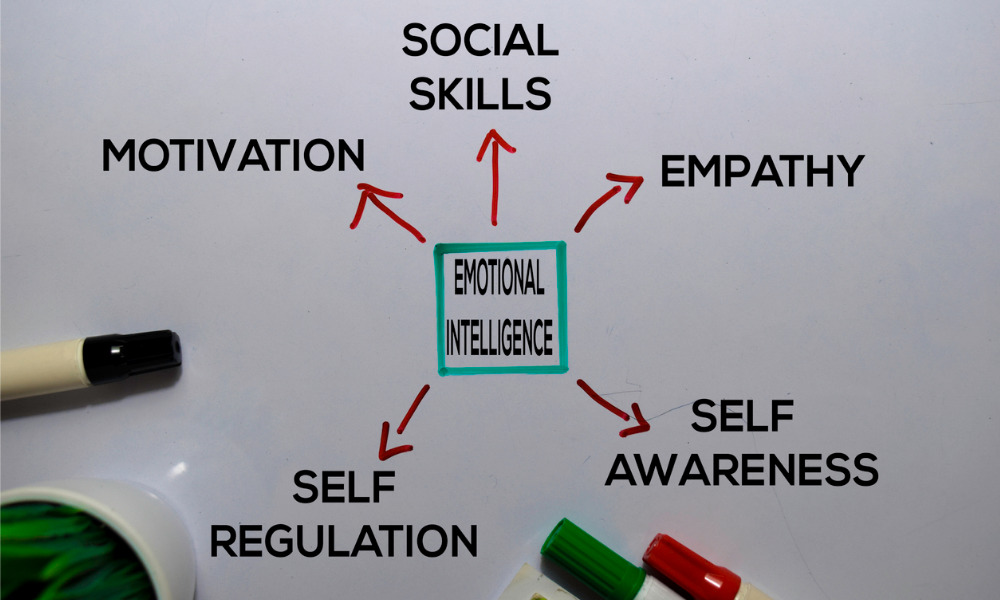
We identify the components of EI and why it's vital for companies to understand them

Understanding and properly utilizing emotional intelligence in the workplace is an important step for companies to stay competitive and relevant to their customers and employees.
But what is emotional intelligence? We take a look into what it means and how it can impact the workplace.
Read more: Hiring dilemma: EQ vs IQ
Emotional intelligence (EI) – also known as emotional quotient (EQ) – is the ability of a person to understand and handle emotions in oneself and others. Researchers have identified four different levels of emotional intelligence:
Emotional intelligence is different from intelligence quotient (IQ), which is the intellectual ability of a person to analyze, understand, and resolve problems and issues. Common elements of IQ include the ability to use logic to solve problems, plan and strategize, understand abstract ideas, learn, and adapt to change, as well as grasp and use language. A good balance between EI and IQ helps people interact and connect with other people and their surroundings.
There are many tests to measure a person’s IQ. The most common ones are the Stanford-Binet Intelligence Scale and the Woodcock-Johnson III Tests of Cognitive Abilities. For measuring EI, standard tests include the Mayer-Salovey-Caruso Emotional Intelligence Tests and the Situational Tests of Emotional Understanding.
Read more: Managers negligent on emotional intelligence
Emotional intelligence is just as vital in the workplace as IQ. Having a high level of EI in the organization helps employees understand and process nonverbal communications
EI in the workplace also helps employees be more aware of their personal emotions. It helps them analyze and adjust their behavior before it becomes a problem for a client or co-worker.
Additionally, EI helps employees to improve efficiencies. For example, when employees are empathetic and understanding of other people’s emotions, they can make decisions that work for everyone and can find new ways to complete tasks more efficiently.
There are five main elements of emotional intelligence, according to psychologist Daniel Goleman:
Self-awareness is the ability to recognize and understand one’s emotions, motivations, and abilities. Having self-awareness also allows one to understand the effect their emotions have on others.
Being self-aware helps employees understand how they are viewed by co-workers, clients, and managers. It also allows employees and leaders to accept feedback from colleagues.
Self-regulation is the ability to control one’s impulses, adjust their emotions before speaking or acting, and express themselves appropriately to create a more positive effect on the situation.
Self-regulation allows employees to take responsibility for their actions, adapt to change, and respond appropriately to co-workers and clients’ emotions and behavior. Without self-regulation, emotional outbursts are likely to happen, which can affect work relationships.
Motivation is the urge and desire to do something. Motivation gives a person an interest in learning and self-improvement as well as the strength to keep going despite the challenges they face.
Motivation gives employees goals and desires to accomplish, which can promote different feelings throughout the process, which develops the emotional intelligence of an employee.
Empathy is the ability to recognize and understand other people’s emotions and reactions. According to Goleman, empathy can only be achieved when self-awareness is achieved, as he believes people must understand themselves before understanding others.
In the workplace, an employee who has empathy can understand their colleagues' feelings and can handle workplace situations more effectively. In addition, people are more likely to connect to a colleague who shows genuine empathy.
Social skills are the skills needed to communicate and interact with other people. This skill allows people to pick up on jokes, hold meaningful conversations with others, maintain friendships and relationships, sarcasm, and find common ground with other people.
Having strong social skills in the office allows employees to listen, speak, and resolve conflicts more effectively. It helps employees make friends, build rapport, and gain the trust and respect of their co-workers. Social skills help leaders connect and communicate with their members on a deeper level.
There are many traits and signs that an employee has a high EI. Identifying these signs can help HR leaders assess where the employees stand in terms of EI and make appropriate actions where it’s needed.
People with high EI make better decisions and confidently solve problems. Employees with high EI are also calm under pressure and can listen, reflect, and respond to constructive criticism without denial, blame, and excuses. In addition, these people are confident and can laugh at themselves and their mistakes.
Employees with high EI do not mind taking the initiative to achieve goals and are committed to completing a task. Other high EI traits include being curious, setting healthy boundaries, remaining optimistic, and encouraging flexibility and embracing change.
Managers should also watch out for employees who have low EI. These employees constantly blame others, avoid taking responsibility for errors, use passive or aggressive communication styles, refuse to work as a team, and overly critical of others’ opinions. Leaders should hold discussions with employees who possess these traits and work together to address these concerns before it affects other employees.
HR leaders can no longer afford to ignore the need for emotional intelligence in the workplace and improve the quality of work and relationships in organizations. Corporate Dojo founder Karen Gately tells HRD that managing emotions and relationships is now being prioritized more than managing time.
Gately adds, “A lack of emotional intelligence from both leaders and employees all too often creates unnecessary anxiety, resistance and depression. What matters most is that leaders demonstrate compassion and act with sensitivity if they want people to adapt when they need to.”